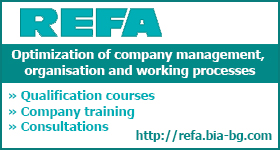Business Industry Capital
|
Bulgaria
|
|  | |
|
BNB Exchange Rates
(12.12.2019) |
|---|
| |
EUR |
|
1.95583 |
|
| GBP |
|
2.32160 |
| USD |
|
1.76599 |
| CHF |
|
1.79171 |
| EUR/USD |
|
1.1075* |
|
ECB exchange rate |
|
Basic Interest Rate |
| |
as of 01.12 |
|
0 % |
|
|
|
 |
Financial news |
 |
Between January and September 2019 Bulgaria’s exports to the EU increased with 3.3% as compared to the same period in 2018 to the tune of EUR 14.852 billion, the National Statistical Institute announced. The export to Germany, Romania, Italy, Greece, France and Belgium was 66.3% of Bulgaria’s total exports to the EU. Meanwhile, imports increased 2.2% to EUR 15.446 billion. The largest volume of goods was imported from Germany, Italy, Romania, Greece and Spain. Bulgaria’s foreign trade balance with the EU for the period is negative to the tune of EUR 594 million. Source: BNR
In October, retail sales are driven mainly by the clothing and footwear trade, computer and communications equipment. Merchant turnover slows down, according to the National Statistics Institute (NSI) calendar-adjusted data. Turnover in the section "Retail trade, except of motor vehicles and motorcycles" at comparable prices maintains the level of the previous month according to preliminary seasonally adjusted data. Compared to a year earlier, the growth was 1.2 percent. On an annual basis, in October turnover increased in retail trade of non-food goods, excluding trade in motor fuels and lubricants (by 2.1%) and in motor fuels and lubricants (by 1.6%). A decrease was observed in the retail trade of food, beverages and tobacco (by 0.2%). The more significant growth in the retail trade of non-food goods, excluding the trade in automotive fuels and lubricants, was observed in: trade in textiles, clothing, footwear and leather goods - by 8.9%, sale of computer and communication equipment - by 8.8% and non-specialized stores with miscellaneous goods by 6.3%. Retail trade in pharmaceutical and medical goods decreased by 10.7%. Source: investor.bg
 |
|
MyCompetence offers a good practice and an example for other countries
© European Union, 2019 with financial support from the European Union Programme for Employment and Social Innovation "EaSI" (2014-2020).
Peer Review on “Competence Assessment System: MyCompetence”, Sofia (Bulgaria), 28-29 November 2019
This Peer Review focused on the benefits of competence assessment systems to address skills mismatches in the labour market. Key discussion points included Member States’ practices in developing competence frameworks and professional standards, links between labour market and the education and training sector, how skills assessments are carried out in practice, and in what ways labour market actors can be systematically involved in the forecasting of skills and competences.
The Bulgarian Ministry of Labour and Social Policy hosted the Peer Review and presented the Bulgarian Labour Force Competence Assessment System: ‘MyCompetence’ (MC). MC is a holistic system that integrates sector competence models with self-assessment tools and online courses. MC includes 370 competence models of key jobs positions in 25 economic sectors. Each competence model contains a detailed description of the job position, tasks, responsibilities and qualification required, as well as soft skills and competences. The system was developed by the Bulgarian Industrial Association (BIA) in cooperation with two national trade unions. The implementation of MC is supported by the ‘National Competence Assessment Network’ which includes various Bulgarian stakeholder groups (employers, HR managers, Public Employment Services, education and training providers and thematic experts).
Full text of the analysis
You may send your comments to: bic@bia-bg.com
|
 |
|
 |
 |
Companies |
 |
The European Investment Bank (EIB) has granted a loan of EUR 65 million to KCM JSC, a Bulgarian producer of lead and zinc, the European Commission said. The agreement is backed by the European Fund for Strategic Investments (EFSI), the heart of the Investment Plan for Europe, the so-called Juncker Plan. KCM JSC will use the loan to modernize the company's technologies in the period 2020-2023. The project includes the modernization and expansion of the refinery for lead and precious metals, as well as the modernization of the zinc electrolysis plant. The project will increase the recycling capacity of various types of lead and zinc secondary raw materials by 15%. At the same time, the share of recyclables will increase significantly, which will help in a more efficient and sustainable production process. Source: Trud
Bulgarian public gas supplier Bulgargaz has proposed a 1.94% decrease in the wholesale price of natural gas, to be valid in the first quarter of 2020. According to the proposal, the price will fall by BGN 0.87 to BGN 43.98 per MWh, excluding VAT and excise duty. Bulgarian energy regulations require Bulgargaz to set the gas price quarterly, taking into account global oil prices and the BGN/USD exchange rate. The Energy and Water Regulatory Commission (EWRC) has the final say on the proposed changes in the wholesale price, at which the state-owned company sells natural gas to end-suppliers and customers directly connected to its transmission network. Bulgaria currently imports almost all of the natural gas it needs from Russia via a pipeline crossing Ukraine, Moldova and Romania. Two high-tech companies from Western Europe will start operations in Blagoevgrad opening over 800 new jobs. Detailed development plans for the terrains are being prepared, said Mayor Rumen Tomov. One of the investors is a German company that has 50 bases globally and is structure-defining in the production of medical prostheses sector. The company has purchased a plot in the industrial zone of Blagoevgrad and is currently preparing construction papers. It will provide 100 jobs initially with an option to reach 300. The investment is EUR 10 million. The second company to be opened is working in the field of food industry: "The company is Danish, the investment is BGN 50 million, approximately between 500 and 600 new jobs would be opened, said Mayor Tomov”. According to him, it is also a structure-defining enterprise, because a large number of people would be needed to supply it with raw materials. Source: BNR
Petromel 1 LTD signed a preliminary contract to sell the mill in the village of Komoshtitsa, Yakimovo municipality for BGN 3.64 million, excl. VAT, the main owner of the company, Synergon Holding JSC reported. The buyer is a Greek citizen, Georgios Kepenos. Petromel 1 LTD is to sell a share of a newly formed company, in the capital of which fixed tangible assets represented by the mill will be paid as non-monetary contribution. Petromel 1 LTD is the only mill in the country with fully computerized flour production. The holding's share in the company's capital is 99%. In November 2019, Synergon announced that its subsidiary Shamot JSC, Elin Pelin, had entered into a preliminary contract for the sale of a property for BGN 3.08 million with Technopolis. At the beginning of this year Synergon Holding JSC received up to BGN 45 million a deposit from its subsidiary Synergon Hotels, which in turn sold Grand Hotel Plovdiv. The money is apparently invested in Synergon Petroleum LTD. On February 21, 2019, the share capital of the company was increased by BGN 25 million and Synergon Holding JSC now holds 89.64% share, while Toplivo JSC remains with 10.36%. Source: investor.bg
The profit of the Aurubis Bulgaria copper mining company has decreased by 25% in the last 12 months. This shows the report of the German parent group Aurubis for the financial year 2018/19, which ends at the end of September. The net result of the Bulgarian company for the period is EUR 90.7 million compared to EUR 121.5 million the previous year according to international accounting standards. Production is also declining due to temporary interruption of scheduled repair work and unplanned shutdowns. Aurubis' profit declines for the second consecutive year after the company reported a record EUR 176.5 million (BGN 345.3 million) for the financial year 2016/17. Overall, revenue for the financial year slightly increased (3%), reaching EUR 10.7 billion. Operating profit before taxes (EBT), which is a key indicator for investors, is down significantly - by 14% to EUR 304 million. The main reason was the planned and unplanned shutdowns of the Pirdop and Hamburg plants, which led to a decrease in the processed concentrate quantities and, accordingly, to the fees received. Source: Capital
|
|
Bulgarian Industrial Association
|
|
World
|
|  |
 |
Europe |
 |
The European Commission will revise car CO2 standards and move towards zero-emission vehicles in the 2030s, according to the EU’s new Green Deal. Every other mode of transport can expect attention over the next five years too. Under the Commission’s new environmental pact, the EU executive will revise car and van standards by 2021 “to ensure a clear pathway from 2025 towards zero-emission mobility”. It will also propose stricter air pollutant benchmarks for internal combustion engines and there will be an impact assessment on whether to include road transport in the bloc-wide emissions trading system (ETS). New car CO2 rules were only brokered last December, when negotiators decided to endorse a 37.5% reduction target for 2030. For vans, the target was set at 31%. The talks were marked by bitter infighting between MEPs and unconvinced member states. New cars sold after 2021 will have to emit less than 95g of CO2 under the current rules but it is unclear at this stage what will be changed in the review, although EU officials say that the figure will have to drop to zero in the 2030s.
 |
America |
 |
Nestle SA has agreed to sell its U.S. ice cream business to Froneri in a deal valued at $4 billion, moving control of brands including Häagen-Dazs to a joint venture the Swiss group set up in 2016. Froneri was created after Nestle merged its European ice cream business in 20 countries with R&R, a unit of French private equity firm PAI Partners. With operations in regions including Latin America and Asia, it is one of the largest ice cream companies in the world with a turnover of around 2.9 billion Swiss francs ($2.91 billion) as of last year. Wednesday’s deal expands Froneri’s reach to the United States and is expected to add $1.8 billion to annual sales. “(We) are convinced that Froneri’s successful business model can be extended to the U.S. market,” Nestle’s Chief Executive Officer Mark Schneider said. Nestle owns the rights to Häagen-Dazs in the United States, while Yoplait maker General Mills (GIS.N) sells the premium brand in non-U.S. markets. Since taking over reins at Nestle in 2016, Schneider has embarked on a strategy that focuses on selling premium products in high growth categories such as baby food and coffee, while offloading underperforming businesses.
 |
Asia |
 |
About 51.3 percent of China's GDP would be digitalization-related by 2023 as the country's enterprises step up digitalizing their businesses, global market intelligence firm IDC predicted. The research firm estimated that by 2025, at least 80 percent of China's new corporate applications would use artificial intelligence technologies. Chief information officers would play bigger roles within companies by planning for innovative development, while there would be rising demand for professionals in ensuring digital security and compliance, IDC said. China is on fast track for digitalization, while firms should take future-oriented strategies to prepare for related changes, said Kitty Fok, IDC China's managing director. Chinese firms' spending on digital transformation has expanded over a threshold by accounting for 51 percent of their total information technology (IT) expenditure this year, a previous report by IDC and Chinese IT firm Inspur showed. 
|
|
Indexes of Stock Exchanges
11.12.2019 |
| Dow Jones Industrial |
| 27 911.30 |
(29.58) |
| Nasdaq Composite |
| 8 654.05 |
(37.87) |
Commodity exchanges
11.12.2019 |
|---|
| |
Commodity |
Price |
|
| Light crude ($US/bbl.) | 58.90 |
| Heating oil ($US/gal.) | 1.9400 |
| Natural gas ($US/mmbtu) | 2.2500 |
| Unleaded gas ($US/gal.) | 1.6400 |
| Gold ($US/Troy Oz.) | 1 479.50 |
| Silver ($US/Troy Oz.) | 16.96 |
| Platinum ($US/Troy Oz.) | 944.20 |
| Hogs (cents/lb.) | 67.72 |
| Live cattle (cents/lb.) | 125.32 |
|
|
 |
Nevena Kokanova |
 |
 The first lady of the Bulgarian cinema was born on December 12, 1938 in the town of Dupnitsa, south-western Bulgaria. Nevena Kokanova made her start in arts at the age of 18 at the Yambol Theatre without having any special education, and debuted in the cinema with the movie Godini za lyubov (Years for Love). Thus, one of the most impressive paths in the history of Bulgarian theatre and movies began. In the 1960s and 1970s Kokanova became a symbol of the national cinema, embodying personality, charming temper and unique womanliness. Kokanova played more than 50 parts, one of the most remembering being Irina in Tyutyun (Tobacco, 1962) and grievous and passionate Liza in Kradetsat na praskovi (The Peach Thief, 1964). The audience and the critics highly praised her acting as Ana in Karambol (Crack-Up, 1966), Gerda in Dah na bademi (Taste of Almonds, 1967), Neda in Otklonenie (Sidetracked, 1967), which Blaga Dimitrova wrote especially for her, and many others. In 1969 she featured in the movie of the famous Italian director Liliana Cavani – Galileo. Nevena Kokanova won prizes at the Varna festival, and the Golden Camera award of the Union of the Bulgarian Moviemakers. Nevena Kokanova passed away on June 3, 2000.
The first lady of the Bulgarian cinema was born on December 12, 1938 in the town of Dupnitsa, south-western Bulgaria. Nevena Kokanova made her start in arts at the age of 18 at the Yambol Theatre without having any special education, and debuted in the cinema with the movie Godini za lyubov (Years for Love). Thus, one of the most impressive paths in the history of Bulgarian theatre and movies began. In the 1960s and 1970s Kokanova became a symbol of the national cinema, embodying personality, charming temper and unique womanliness. Kokanova played more than 50 parts, one of the most remembering being Irina in Tyutyun (Tobacco, 1962) and grievous and passionate Liza in Kradetsat na praskovi (The Peach Thief, 1964). The audience and the critics highly praised her acting as Ana in Karambol (Crack-Up, 1966), Gerda in Dah na bademi (Taste of Almonds, 1967), Neda in Otklonenie (Sidetracked, 1967), which Blaga Dimitrova wrote especially for her, and many others. In 1969 she featured in the movie of the famous Italian director Liliana Cavani – Galileo. Nevena Kokanova won prizes at the Varna festival, and the Golden Camera award of the Union of the Bulgarian Moviemakers. Nevena Kokanova passed away on June 3, 2000.
|
|
Archive
Business Industry Capital |

 Last Issue
Last Issue

 Subscribe NOW!
Subscribe NOW!

 Analyses
Analyses

 Discover Bulgaria
Discover Bulgaria
 Български
Български

 Archive
Archive
 Last Issue
Last Issue

 Subscribe NOW!
Subscribe NOW!

 Analyses
Analyses

 Discover Bulgaria
Discover Bulgaria
 Български
Български

 Archive
Archive